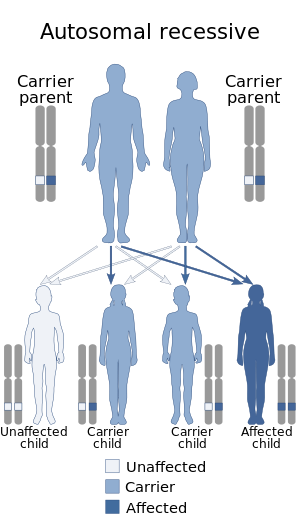| Mismatch repair cancer syndrome | |
|---|---|
| Other names | Brain tumor-polyposis syndrome, Glioma-polyposis syndrome |
 | |
| This condition is inherited in an autosomal recessive manner | |
| Specialty | Oncology |
Mismatch repair cancer syndrome (MMRCS) is a cancer syndrome associated with biallelic DNA mismatch repair mutations.[1] It is also known as Turcot syndrome (after Jacques Turcot, who described the condition in 1959) and by several other names.[1]
In MMRCS, neoplasia typically occurs in both the gut and the central nervous system (CNS).[1] In the large intestine, multiple colonic polyps develop; in the CNS, brain tumors.
YouTube Encyclopedic
-
1/5Views:3 10134 61831 3455 6367 239
-
Mismatch Repair (MMR) Deficiency in Colorectal Cancer
-
Lynch Syndrome (HNPCC) | USMLE Step 1 Mnemonic
-
NEOPLASIA 5: DEFECTS IN DNA REPAIR, DNA repair genes & Associated Cancers
-
Lynch Syndrome (Hereditary Non-Polyposis Colorectal Cancer) Genetics, Symptoms, Diagnosis, Treatment
-
Microsatellite instability and Lynch Syndrome
Transcription
Genetics
Under the name constitutional mismatch repair-deficiency, (CMMR-D), it has been mapped to MLH1, MSH2, MSH6 or PMS2.[2] Monoallelic mutations of these genes are observed in the condition known as Lynch syndrome or hereditary nonpolyposis colorectal cancer, while biallelic mutations are observed in CMMR-D.[3] People expressing the HNPCC (which itself is considered autosomal dominant) trait are considered carriers of CMMR-D, thus CMMR-D is classified as autosomal recessive.[citation needed]
The term "childhood cancer syndrome" has also been proposed.[4][5] Café-au-lait macules have been observed.[6]
Diagnosis
Childhood to early adult onset HNPCC + malignant gliomas. The polyps developed tend to be larger, fewer, and progress to malignancy earlier than those seen in familial adenomatous polyposis,[1] a clinically similar condition with different underlying mutations. Diagnostic testing consists of a blood sample being collected, and a genetic specialist compares two copies of a patient's gene to normal MMR genes. If there are differences in the genes, the specialists are able to further test and decide if the patient has the deficiency. [7]
Treatment
History
OMIM currently includes "Turcot syndrome" under Mismatch repair cancer syndrome. Turcot syndrome is the association between familial polyposis of the colon and brain tumors[8] like medulloblastoma, malignant glioma. It was first reported by Canadian surgeon Jacques Turcot (1914-1977 ) et al. in 1959 and hence carries the first author's name.[9]
See also
References
- ^ a b c d Online Mendelian Inheritance in Man (OMIM): 276300
- ^ Kratz CP, Holter S, Etzler J, Lauten M, Pollett A, Niemeyer CM, Gallinger S, Wimmer K (June 2009). "Rhabdomyosarcoma in patients with constitutional mismatch-repair-deficiency syndrome" (PDF). Journal of Medical Genetics. 46 (6): 418–20. doi:10.1136/jmg.2008.064212. PMID 19293170. S2CID 42347878.
- ^ Wimmer K, Etzler J (September 2008). "Constitutional mismatch repair-deficiency syndrome: have we so far seen only the tip of an iceberg?". Human Genetics. 124 (2): 105–22. doi:10.1007/s00439-008-0542-4. PMID 18709565. S2CID 32654505.
- ^ Krüger S, Kinzel M, Walldorf C, Gottschling S, Bier A, Tinschert S, von Stackelberg A, Henn W, Görgens H, Boue S, Kölble K, Büttner R, Schackert HK (January 2008). "Homozygous PMS2 germline mutations in two families with early-onset haematological malignancy, brain tumours, HNPCC-associated tumours, and signs of neurofibromatosis type 1". European Journal of Human Genetics. 16 (1): 62–72. doi:10.1038/sj.ejhg.5201923. PMID 17851451.
- ^ Tan TY, Orme LM, Lynch E, Croxford MA, Dow C, Dewan PA, Lipton L (March 2008). "Biallelic PMS2 mutations and a distinctive childhood cancer syndrome". Journal of Pediatric Hematology/Oncology. 30 (3): 254–7. doi:10.1097/MPH.0b013e318161aa20. PMID 18376293.
- ^ Jackson CC, Holter S, Pollett A, Clendenning M, Chou S, Senter L, Ramphal R, Gallinger S, Boycott K (June 2008). "Café-au-lait macules and pediatric malignancy caused by biallelic mutations in the DNA mismatch repair (MMR) gene PMS2". Pediatric Blood & Cancer. 50 (6): 1268–70. doi:10.1002/pbc.21514. PMID 18273873. S2CID 34238025.
- ^ "Constitutional Mismatch Repair Deficiency Syndrome". www.stjude.org. Retrieved 2020-03-10.
- ^ "Turcot syndrome" at Dorland's Medical Dictionary
- ^ Turcot J, Despres JP, St Pierre F (1959). "Malignant tumors of the central nervous system associated with familial polyposis of the colon: report of two cases". Diseases of the Colon and Rectum. 2: 465–8. doi:10.1007/bf02616938. PMID 13839882. S2CID 27477524.
